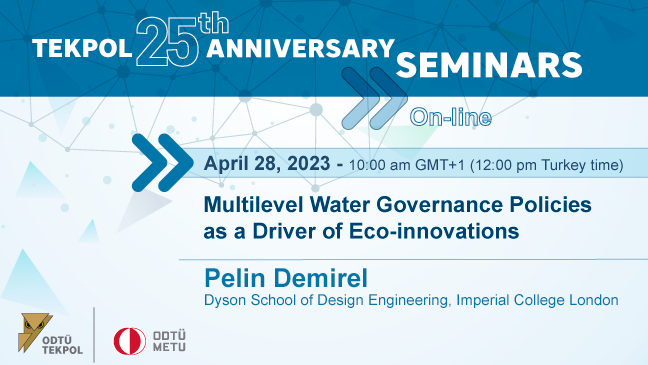TEKPOL 25th Year Anniversary Seminars_Pelin Demirel_28042023
Last Updated:
- English
- Türkçe
Dear TEKPOL Partners,
This year we will be celebrating the 25th Anniversary of TEKPOL's foundation. Therefore we believe it will be a valuable opportunity to reconnect with our partners all over the globe working in the field of science and technology policy making and decided to host a series of online seminars in the spring semester of 2023 academic year.
Our fifth guest will be Pelin Demirel, Dyson School of Design Engineering, Imperial College London Her presentation title is; Multilevel Water Governance Policies as a Driver of Eco-innovations.
The seminar will be held on 28 April (Friday) 2023, at 10:00 GMT+1 (12:00 pm Turkey time) , through ZOOM. The Zoom link will be shared with the registered participants before the session.
Registration is mandatory and the form can be reached through this link:
https://forms.gle/XYdGFxhzbJ1e73LRA
It is possible to register until Thursday evening before the seminar (27 April 2023)
Kind Regards,
TEKPOL, Science and Technology Policy Research Center
About Pelin Demirel:
Pelin Demirel is a Senior Lecturer in Innovation and Enterprise at Dyson School of Design Engineering, Imperial College London. Pelin's research and teaching focus on innovation and entrepreneurship with a particular emphasis on sustainability. Investigating the potential of innovations and entrepreneurship for a more sustainable and inclusive society motivates her most recent research projects. She is one of the Future Leaders at The Foundation for Science and Technology (2021 cohort) and her research is funded by various bodies including Leverhulme Trust, ESRC, EPSRC, MRC and British Academy. She is an Associate Editor of European Management Review and serves on the editorial review board for Small Business Economics Journal. Her work is published in a broad range of journals including Research Policy, Small Business Economics Journal, Regional Studies, Business Strategy & the Environment, Industry & Innovation, Work, Employment and Society and, Environment and Planning A.
About the Seminar:
Multilevel policies that integrate a broader range of stakeholders into the environmental management processes have become essential to govern the complex sustainability transitions globally. This study focuses on China's River Chief System (RCS) policy as a quasi-natural experiment to explore whether and how multilevel water governance policies promote eco-innovations. The results show that the RCS significantly promotes eco-innovation quantity and quality among the firms near the river basin. Additionally, the heterogeneity analysis demonstrates that the effectiveness of multilevel water governance policies are modified by characteristics at the province, city and firm level. Finally, the environmental subsidies are found to compound the positive impact of RCS, suggesting the potentially complementary nature of multilevel environmental policies in policy mixes.
















